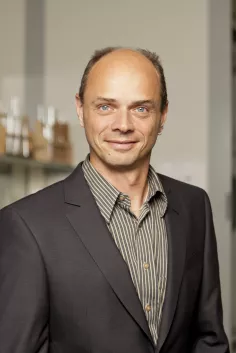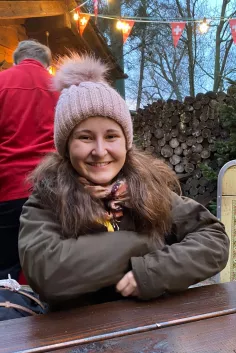Centre for Ethics and Responsibility (ZEV)
Two years Study Programme Responsibility: Sustainable action through ethics and responsibility


Daniel Fine, research assistant at the Center for Ethics and Responsibility (ZEV), has been involved in the accompanying study program since its beginning. In addition to administrative tasks, he advises students on their opportunities in the study program Responsibility. We wanted to know from him what makes the study program Responsibility so special and why it can be a great opportunity.
H-BRS: Daniel, when did you join and how did it all actually start?
Daniel Fine: I've been at the university since 1998, and I've been studying responsibility since 2021. It started many years earlier, but back then it was still called Blue Track and was an offer in Department 05. The structure was a bit different back then and meant special commitment for the initiators in addition to the normal university routine. Since the "forefather" of the Accompanying Studies program, Klaus Lehmann, has been managing director at ZEV, it has been possible to restructure it and, with my help, to establish it throughout the university.
H-BRS: How many students have already been able to successfully complete the study program Responsibility?
Fine: Since I have been involved, 16 certificates have been issued, and there were also successful graduations before that.
H-BRS: What does a degree like that look like?
Fine: Students must first complete five credit hours and then complete the Studium Verantwortung with a half-day evaluation seminar. A sustainability certificate is then handed out that briefly explains the content of Studium Verantwortung, including the credit points earned, and is signed by the managing directors of IZNE and ZEV as well as the vice president for studies, teaching and continuing education.
H-BRS: What are the requirements to be admitted to Studium Verantwortung and how long does it take?
Fine: In principle, anyone who is enrolled as a student at our university can participate. The duration is determined by each student him/herself, there are no requirements. The only limitation is that you have to finish during your time as a university member.
H-BRS: What makes the study program Responsibility so special?
Fine: Topics of sustainability and ethical reflections on interrelationships and processes of change, even outside of one's own discipline, cannot always be represented in the specialized courses of study. Anyone who wants to delve deeper into this area will find a place for it in the Responsibility Studies program. We advise students individually, so that the self-constructed study program Responsibility gets a "red thread" and fits to the own curriculum vitae, especially with regard to what comes after the study. In addition, we offer a voluntary support seminar at regular intervals, where students from all departments come together to discuss and exchange ideas on topics they have chosen themselves or that we have suggested. I am always amazed at how interesting and inspiring it is when topics from completely different disciplines are examined. This interdisciplinarity.
H-BRS: Why do you think students should take advantage of the offer?
Fine: Studying Responsibility lures students out of the comfort zone of their own professional interest and causes them to be able to consciously change their perspective. It raises awareness of the major transformation processes that are already underway or still to come. Companies that want to survive in this changing world must face up to the associated challenges and are increasingly interested in having applicants with an appropriate curriculum vitae. We are already seeing that students can score points with the certificate when looking for a job. Some graduates have even taken a special career path because of their participation in the study program Responsibility program.
H-BRS: Has there been a moment in the last two years that stands out in your memory?
Fine: I was particularly impressed by the last evaluation seminar, where three students presented their path through the Studium Verantwortung. It really made me realize how much the personality of a young adult can develop in the most positive sense. The presentations were very different, but they were coherent and characterized by a high degree of reflection, which was certainly not apparent at the beginning of the studies.
H-BRS: What do you wish for the study program responsibility in the future?
Fine: For the (still somewhat more distant) future, it would be interesting to perhaps be able to offer the course to external interested parties.
Since the interest and thus also the number of participants is constantly growing, we are, however, above all dependent on being able to master the organization of Studium Verantwortung with permanent positions. Such an offer must absolutely remain at the university!
What do students say about the offer?

Valerie Wiedemann is a student at H-BRS and complements her master's degree in "Analytical Chemistry and Quality Assurance" in the 05 department with the study program responsibility.
H-BRS: Valerie, why did you decide to study responsibility?
Valerie Wiedemann: After completing my bachelor's degree, I was looking for a suitable master's program. Although I was interested in studying analytical chemistry, sustainability was an important concern for me that will accompany us all throughout our lives. Therefore, I decided to study responsibility. Because of the interdisciplinary nature and many offerings of the university, I hoped to gain different perspectives on the topic of sustainability.
H-BRS: What do you hope to gain from the sustainability certificate that you will receive after completing the accompanying studies?
Wiedemann: Of course, the sustainability certificate is one of the reasons for doing this accompanying study program, in addition to the experiences and insights that come with responsibility. For me, the certificate means that I am actively involved in my environment, that I am interested in it, and that I am willing to get involved in new things. I also hope that this certificate can express that and a good employer will recognize that.
H-BRS: Would you recommend the Responsibility program to others? And if so, why?
Wiedemann: The Responsibility degree is recommended because you are completely free to focus on interesting topics. The experience varies depending on how you earn your credit hours. Despite the smaller time budget in the master's program, I have already been able to gain a wide variety of experiences. The exchange with other students helps to question one's own focus and to adjust one's evaluation horizon. Through open dialogue with other majors, you learn about controversial opinions and realize that as a student, you live in a subject bubble that should be permeable. Thus, the path to the goal is as individual as the participants in the companion study, and all participate in the paths of others in the process.
You can find more statements from students and more information about the study program Responsibility on the following website: www.h-brs.de/studium-verantwortung
More Insights to the study program Responsibility gives Susann Kabisch in the following podcast (german):
The team from the Center for Ethics and Responsibility (ZEV) is always available to answer questions.
Contact Point
Contact ZEV
Room
H 010